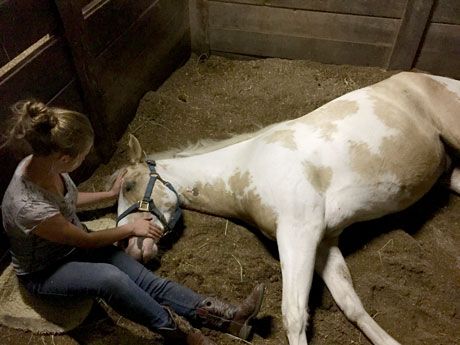Veterinary report implicates contaminated feed in deaths of multiple horses
Horse owners, equine center seek large settlement as result of monensin poisoning.

Dallas, one of three horses that died at Masterpiece Equine Center in Davie, Florida, as a result of contaminated feed. Photo courtesy of Grossman Roth, P.A.Down and bleeding from the nose, Rudy, a 15-year-old gelding thoroughbred, was found Sunday, Oct. 19, where he was boarded at Masterpiece Equestrian Center in Davie, Florida. His temperature was 102, with tachycardia and jugular pulse.
The horse managed to stand, but hung his head with subdued mentation. Rudy's condition progressed to trembling and shaking, when he collapsed and died. Rudy was one of three horses that died or was euthanized with similar clinical signs between Oct. 16 and 20 at the ranch and riding school. The common factor was their feed.
Necropsies performed on two of the three horses by Serena Craft, DVM, DACVP, Kyle R. Taylor, DVM, PhD, and Joanna Hyland DVM, MS, DACVP, found evidence consistent with acute ionophore toxicity. The feed, produced by Kentucky-based Lakeland Animal Nutrition, showed high levels of monensin. Known on the retail market as Remensin, the medication is commonly added to cattle feed to promote growth but can be toxic to horses.
"Horses are extremely sensitive to ionophore toxicity, and myocardial damage typically predominates over skeletal muscle damage in this species," Hyland wrote on the necropsy report. "Clinical signs in equids include, but are not limited to, signs of colic, apprehension, shifting or fidgeting, sweating, myoglobinuria and muscle tremors." Additional signs seen in the other two horses included hind limb paralysis and dragging toes.
Both necropsies found cardiac damage consistent with monensin poisoning. Rudy's death was attributed to terminal cardiac damage resulting in acute congestive heart failure. Further testing by the Florida Department of Agriculture and Consumer Services found that four of nine tests of Lakeland feed sampled from Masterpiece Equine Center were contaminated with monensin. A fifth sample tested positive for both monensin and lasalocid.
Lakeland Animal Nutrition voluntarily recalled four of its horse feeds Oct. 22 after accusations of contamination began. Specific lots of Signature Status Pellet and LAN 10 Pellet were pulled from shelves and the company ceased production of equine feeds indefinitely. The company has since announced it will no longer manufacturer equine feeds but focus on its core livestock business.
"We are committed to working with the Masterpiece Equestrian family to bring restoration in the midst of their tragic losses," reads Lakeland Animal Nutrition's website. "Although we can never replace their horses or take away the pain of this tragedy, we are working with their representatives to expedite a resolution."
Masterpiece Equestrian Center's lawyer, Andrew B. Yaffa, is counting on it. He says this is a case of absolute liability that should be resolved without litigation; however, he adds, "Should they play games, we will not hesitate to initiate litigation against them."
Yaffa would not provide an amount that would satisfy horse owners and ranch owners. It has been reported that horses boarded at Masterpiece, a high-level training school for show and jumping horses and riders, can be worth anywhere from $35,000 to hundreds of thousands of dollars. He says the case has substantial value, citing the loss of high-value horses "along with a total loss of a business that is struggling to survive now that all of its horses have been rendered useless and are deteriorating before their eyes."
Yaffa says another 19 horses are permanently disabled due to consumption of the Lakeland feed. The irreversible effects of the poisoning are attested to in Hyland's necropsy report. "Myocardial lesions in monensin toxicity are not reparable and the probability of lasting cardiac insufficiency is high in horses exposed to sublethal doses," she wrote.
The Lakeland website says an internal investigation is underway in addition to the investigation by the Florida Department of Agriculture and Consumer Services. "Our thoughts are with the Masterpiece Equestrian family, and, although their horses could never be replaced, we are committed to doing all we can to bring comfort to them in their suffering."
Yaffa says he is hopeful a settlement can be reached. "I have had some positive communications and am hopeful they will do the right thing," he says.